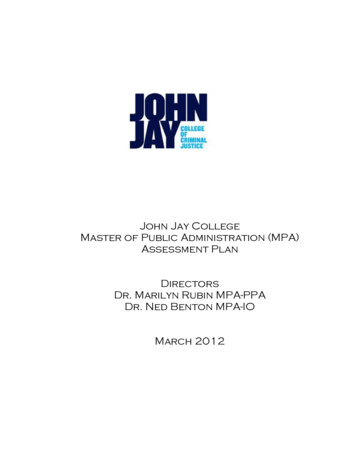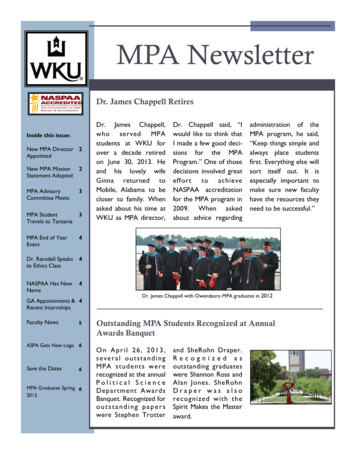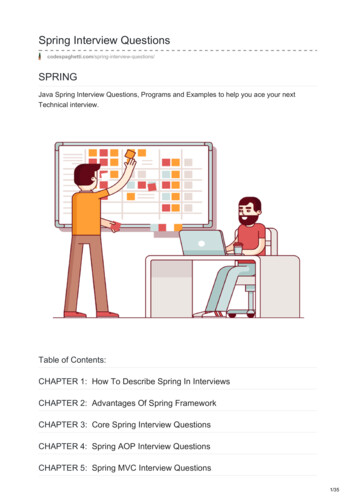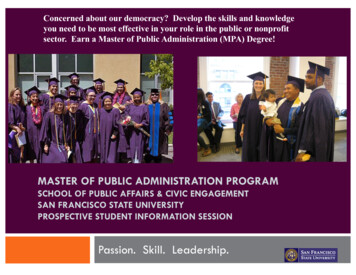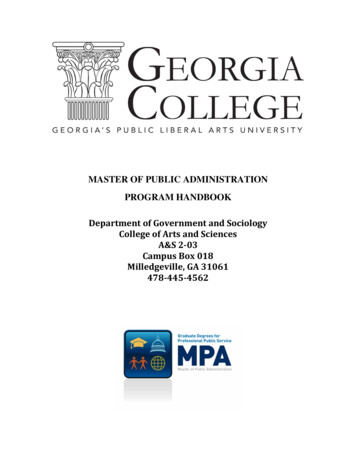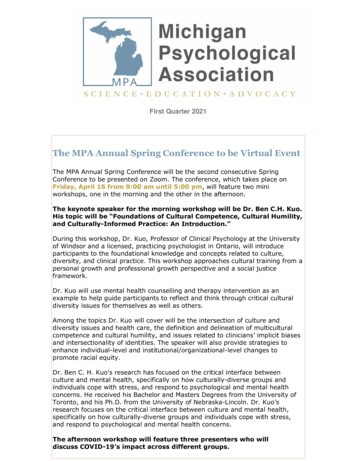
Transcription
First Quarter 2021The MPA Annual Spring Conference to be Virtual EventThe MPA Annual Spring Conference will be the second consecutive SpringConference to be presented on Zoom. The conference, which takes place onFriday, April 16 from 9:00 am until 5:00 pm, will feature two miniworkshops, one in the morning and the other in the afternoon.The keynote speaker for the morning workshop will be Dr. Ben C.H. Kuo.His topic will be “Foundations of Cultural Competence, Cultural Humility,and Culturally-Informed Practice: An Introduction.”During this workshop, Dr. Kuo, Professor of Clinical Psychology at the Universityof Windsor and a licensed, practicing psychologist in Ontario, will introduceparticipants to the foundational knowledge and concepts related to culture,diversity, and clinical practice. This workshop approaches cultural training from apersonal growth and professional growth perspective and a social justiceframework.Dr. Kuo will use mental health counselling and therapy intervention as anexample to help guide participants to reflect and think through critical culturaldiversity issues for themselves as well as others.Among the topics Dr. Kuo will cover will be the intersection of culture anddiversity issues and health care, the definition and delineation of multiculturalcompetence and cultural humility, and issues related to clinicians’ implicit biasesand intersectionality of identities. The speaker will also provide strategies toenhance individual-level and institutional/organizational-level changes topromote racial equity.Dr. Ben C. H. Kuo’s research has focused on the critical interface betweenculture and mental health, specifically on how culturally-diverse groups andindividuals cope with stress, and respond to psychological and mental healthconcerns. He received his Bachelor and Masters Degrees from the University ofToronto, and his Ph.D. from the University of Nebraska-Lincoln. Dr. Kuo’sresearch focuses on the critical interface between culture and mental health,specifically on how culturally-diverse groups and individuals cope with stress,and respond to psychological and mental health concerns.The afternoon workshop will feature three presenters who willdiscuss COVID-19’s impact across different groups.
PRESENTER 1: Dr. Brenda WhitehallStarting the afternoon sess ion, Dr. Brenda Whitehall will talk about “OlderAdults' Experience of COVID-19: Stress, Coping, and Resilience.” In this talk, Dr.Whitehead will discuss older adults' experience with the COVID-19 pandemicthrough the lens of stress and coping. She will present findings from her ownmixed-methods study, conducted during the first months of the pandemic,regarding factors contributing to older adults' stress experience as well aseffective approaches to coping. Her presentation will conclude with presentconsiderations and future implications, given the evolving nature of thepandemic.Dr. Whitehead is an Associate Professor of Psychology at the University ofMichigan-Dearborn, and earned her M.A. and Ph.D. in Lifespan DevelopmentalPsychology from the University of Notre Dame. Dr. Whitehead's researchspecialty is gerontology, with investigations focusing on stress and coping, theintersection of mental and physical health, and –most recently – older adults'experiences with the COVID-19 pandemic. Dr. Whitehead's work has beenpublished in top peer-reviewed journals of the field, including The Gerontologist,The Journals of Gerontology, Aging & Mental Health, Journal of HealthPsychology, and Psychology & Aging.PRESENTER 2: Dr. Valencia MontgomeryThe second presenter in the afternoon workshop will be Dr. ValenciaMontgomery, who will be speaking on “Cognition and COVID-19: LessonsLearned from Cases.”In this seminar, participants will learn about the current trends in COVID-19cognitive impairment through the literature and actual cases. Dr. Montgomerywill also examine the current cognitive batteries utilized for assessment, currentmodels for neuro-Covid assessments, and issues on health equity. Participantswill receive information on current research, and future researchrecommendations will be shared.A Chicago native, Dr. Montgomery earned her Doctorate in Clinical Psychology,with an emphasis in Neuropsychology, from Roosevelt University and completeda competitive internship at the VA Ann Arbor Healthcare System. She completedher 2-year postdoctoral fellowship in neuropsychology at UCLA Geffen School ofMedicine in Los Angeles and the Easton Center for Alzheimer's Disease Researchin July, 2019. Currently, she provides neuropsychological services on theinpatient rehabilitation unit at St. Joseph Mercy Health System Ann Arbor, andhas treated several patients hospitalized with COVID-19. She is also Treasurer ofthe Michigan Psychological Association.Passionate about helping others understand the course, diagnosis, and treatmentof Alzheimer’s disease and other dementias, she believes that communityengagement is a critical component of wellness and has been a sought-afterspeaker in the Los Angeles area on the subject of dementia. She strives toprovide culturally sensitive treatment to individuals affected by poor access toservices.PRESENTER 3: Dr. Julie BraciszewskiThe final speaker in the afternoon workshop will be Dr. Julie Braciszewski. Hertalk is entitled “The Path Forward: Understanding & Addressing the MentalHealth Impacts of COVID-19 on Kids and Adolescents.”The pandemic has made an indelible impact on children’s and adolescents’ livessince they have not been able to attend, at least in many districts, for a year.That means that we have all come to realize that the COVID-19 pandemic has
affected all domains of mental health functioning for children and teens – andthat this impact will continue far into the future.Dr. Braciszewski will utilize current snapshots of data from around the world,combined with historical context, to bring into sharper focus what these longterm effects will be. She will discuss psychological assessment and treatmentwithin a developmentally-informed and trauma-focused emphasis to try tosuggest what the path forward will look like. She will discuss clinical tools andinsights that will help support youth and families through the remainder of thepandemic.Julie Braciszewski, PhD, LP is a practicing clinical psychologist as well as ownerand Clinical Director of Monarch Behavioral Health in Bloomfield Hills,Michigan. In addition to providing direct care to children, adolescents, andfamilies, she provides professional development for community agencies,schools, and businesses. She is often a contributing guest on media outlets suchas National Public Radio and Metro Detroit news programs. Dr. Braciszewski ispassionate about translating psychological and neuropsychological research intodirect care, providing research-based assessment and therapy, while addressingimportant cultural and contextual factors. After earning her bachelor’s degree atthe University of Michigan, Dr. Braciszewski completed her Master’s and Doctoraleducation at Wayne State University. She completed a pre-doctoral internship atHawthorn Center in Northville, Michigan and post-doctoral studies at BrownUniversity, Warren Alpert School of Medicine.Registration for the Annual Spring Conference is available on theMichigan Psychological Association website.Back to top
From the President's Desk: Transitioning to PresidentAntu Segal, PsyD, ABPPThe transition from MPA’s President-Elect to President has been an excitingventure. As an early career psychologist (ECP), opportunities and training inleadership roles have been rare. I signed up to participate in two leadershipseminars in 2020; both were canceled due to COVID-19. I was therefore feelinga bit intimidated by the prospect of transitioning to the position of President.I have been fortunate, however. I have had the opportunity to shadow PastPresidents, Drs. Lissa Patterson and Joy Wolfe Ensor. They have provided mewith a wealth of knowledge. Of particular note, how to build resilience inchallenging times within the Board by improving inter-committeecommunication, create policies and procedures that shape the mission andvalues of the MPA, and work together to foster innovation in the Board’scommunication with its members. Additionally, last Fall I was able to participatein the American Psychological Association’s Emerging Leadership Academy whereI was able to start fostering what it means to be a leader to myself. All theseminars were spectacular! I recommend the seminar series to any ECP who isinterested in leadership roles at work, or within your state psychologicalassociation (hint, hint). Drs. Eduardo Salas and Scott Tannenbaum’spresentation on the science of teamwork was relevant to me as I work in anintegrated medical team. The presenter’s focus on the psychological researchthat drives team performance motivated me to also think of the MPA’s ExecutiveCommittee and Board as a collaborative team with a common mission to serveall psychologists in Michigan and the public welfare.At the end of each year, the MPA Board gathers for a retreat to review the yearand look to the future. In November, 2020, the Board examined MPA’s strategicplan. The Board decided to emphasize goals regarding increasing membershipfor graduate students, ECPs, and academics. Also, to diversify MPAprogramming to include culturally relevant one-hour seminars, panel discussionsand full-day conferences. To start a leadership pipeline and strengthen MPA’sdiversity and advocacy initiatives. More to come as the year unwinds!Regarding another important transition, I want the MPA membership to knowthat we are actively working to hire an Executive Director.On another note, as interim Program Committee Chair, I am excited to announcethat the Spring Annual registration is open! Consider joining the MPA on April16th to listen and learn from the amazing speaker line up (6 CEs). In the
morning, Dr. Ben C. H. Kuo will be discussing the “Foundations of CulturalCompetence, Cultural Humility, and Culturally-Informed Practice,” which is animportant topic that warrants much longer than a few hours. I am lookingforward to learning more about the culturally-informed approaches andtechniques, as well as the breakout room discussions with attendees. In theafternoon, we have a panel of speakers who serve different populations withinvarious settings, and who will be discussing the impact of COVID-19. TheProgram Committee’s goal was to recruit Michigan psychologists who coulddiscuss their clinical work and research with children and adolescents, olderadults and the neurocognitive sequelae. Looking forward to seeing you there!If you are interested in being a speaker for a future MPA event, please let meknow. The MPA Program Committee would like to showcase your clinical workand research!(To comment on this article, contact Antu Segal, PsyD)Back to topViolence at the U.S. Capitol: Statement from the MPABoardStatement from the MPA BoardThe Michigan Psychological Association condemns the violence witnessed onJanuary 6, 2021 at the U.S. Capitol. This horrific and deadly incursion wasespecially troubling to us as Michiganders, as it followed a protest by armedmilitias in our State Capitol, as well as a domestic terrorist plot against ourGovernor.We support the American Psychological Association’s statement,and furtherendorse that trauma is cumulative and psychologists have a critical role to playin informing the public on psychological science as it pertains to anti-racism andbuilding resilience during uncertain times within our communities.APA President and CEO Condemn Violence at CapitolDear APA Members,The recent storming of the U.S. Capitol has shocked our nation and the world.After 200 years of peaceful transfers of power between political parties, we wereassaulted with images of rioters desecrating one of our greatest symbols ofdemocracy. Regardless of our political views, we can agree that hate andviolence toward each other are never acceptable.All of this took place as our nation has been emerging from a year dominated bytrauma—a rapidly spreading virus, widespread divisiveness, and economicuncertainty. These layers of trauma are cumulative and make it difficult tofunction.Psychology is of immense value in a time of such complex tragedy and trauma.It is vital that our science and professional expertise are utilized to help heal thepolitical, economic, and ideological divides in our country.
Misinformation and conspiracy theories are at the root of this week’s tragedies.Despite every state certifying the results, and those results being validated bydozens of courts across the nation, repeated claims from the President that thepresidential election was “rigged” or “stolen” drove Wednesday’s demonstratorsto engage in the mayhem we witnessed. As psychologists, we understand thehuman propensity toward confirmation bias. We must continue to educate peopleon how to resist seeking out information that supports their own viewpoint andpromote the use of techniques that encourage more objective consideration. Thecontinued propagation of mistruths fosters tribalism, outrage, and rancor, whichprevents us as individuals from seeing our shared humanity and interests.There is much to do, and APA is taking action. We have been educating reportersand the public on the science underlying trauma and resilience, politicalpsychology and polarization, misinformation and conspiracy theories, and how totalk to children about traumatic events. We have been working with members ofCongress and both the outgoing and the incoming administrations to ensure thatpsychology and our science is not just at the table, but informing vital decisions.Our APA task force on police use of force is underway and releasingrecommendations early this year. And our members—all of you—are using yourexpertise to help individuals, communities, and policymakers.The work that we do as a field is critical. It is understandable if you are feelingshaken, angry, or emotionally exhausted. But recognize that—as a part of theAPA community—you are not alone. We are all in this together and we must beintentional in taking care of ourselves and supporting each other as wework through this national trauma in all its forms.Our nation faces immense challenges that will not end on Inauguration Day.Psychology and our association must play a critical role in addressing thosechallenges. Most people—across the political spectrum—want the best for ourcountry. Together, we must look toward the future. Psychologists offer scienceand expertise that can promote hope, resilience, and a path forward for a nationthat is in trauma and in need of healing. APA is committed to doing that workwith all of you.Jennifer and ArthurJennifer F. Kelly, PhD, ABPPPresident - American Psychological AssociationLicensed PsychologistBoard Certified in Clinical Health PsychologyArthur C. Evans, Jr., PhDChief Executive Officer/Executive Vice PresidentAmerican Psychological Association(To comment on these statements, contact Sarah E. Domoff, PhD)Back to top
Taxes Do Not Need to be so TaxingValerie L. Shebroe, Ph.D.If you are in an independent practice in psychology,chances are that you never received any training inthe business of practice issues. And the chances aregood that you quickly discovered that having anindependent practice is not a hobby – it is abusiness.Very likely you also learned that to become moresavvy about business accounting, retirementinvesting, running a business, and figuring out taxeswas your responsibility. No one was going to teachyou what you needed to know to be successful.While it is beyond the scope of this article to discuss setting up the structure ofyour business or to teach you accounting, I would like to share with you whatI’ve learned from my practice about taxes.My favorite tax guide, which is updated every year, is” J.K. Lasser’s SmallBusiness Taxes.” You may think it’s boring, but it can be exciting to learn abouthow to save money through business deductions. The 2021 edition providesmore than 700 pages of how to save money on your taxes. And believe it ornot, the IRS website is fairly easy to navigate.Although there are do it yourself web-based tax programs, my bias is that it iswell worth consulting with an accountant who specializes in small business taxesto make sure you are capturing accurately all of the business deductions towhich you are entitled. Just as there are self-help psychology resources,computer tax programs are do it yourself, but a consultation with a professionalis well worth the time and money.Whether you are a Sole Proprietor or an S Corp, the documentation principlesare the same when it comes to recording expenses. It's all about behavior. Thesooner you document data after a purchase or charge, the more data (thinkdeductions) you will capture. Deductions equal savings. No matter what systemyou employ, the most important thing is that you find a system that works foryou.William E. Boss, CPA, of William Boss and Associates, PC, East Lansing, Michigan,comments that small business owners should “seek advice from the inception oftheir business to determine the correct entity type and form or record keeping;whether it is spreadsheets or bookkeeping software, such as QuickBooks.”William Boss says that, “the biggest mistake I see small business clients makingis not being organized and keeping good records.”I have done my business books a number of ways: monthly, quarterly and, once,even, annually. The annual method was a dream for 363 days. But it took twosolid days of sorting and recording documentation, and in the end, it was notworth the stress and emotional agony to use the annual accounting method. AndI was convinced that all of my business expenses were not being captured. Keepthis in mind: the more contemporaneous your accounting, the more deductionsyou will capture.My current system involves writing the deduction category on each receipt,
documenting the purpose and putting all hard copy receipts in a file to sort atthe end of the month, along with my business credit card and business checkingaccount statements. I then reconcile my receipts with my credit card statementsand document the mileage on the credit card statements as well as businesscheckbook and bank account statement.While there are mileage tracker aps, I found it easier to make a “Mileage CheatSheet” that has a listing of the common places I drive for business. This makesdocumenting miles easier. Even if you don't think documenting certain data is"worth" it, do it anyway. For example, for a year’s worth of business mileage, ittook me about an hour to add up my business miles. But, in that hour I "made"a 1000.00 deduction (multiplying miles driven by the mileage rate for thatyear). That's not chump change!From a behavioral perspective, I keep my business credit card in my wallet ontop of my major personal credit card. Seeing my business card triggers thisquestion: Is this a business deductible expense? If I can rationalize it (and havediscussed it with my accountant), I charge it to my business.Finding money to invest in your retirement also involves a mindset–and it affectsyour taxes. My rule of thumb: If you can afford to eat out, you can afford toinvest for retirement. That doesn’t mean that I’m saying you should never eatout. It’s even better to eat out if you can deduct it as a business expense.Likewise, a café coffee will taste better if you can deduct it because you aremeeting a colleague to discuss referrals. The principle to keep in mind is thatspending and expenses should be carefully evaluated in the context of yourretirement future. Having this mindset will not feel like deprivation; you will feelmore secure knowing that you are preparing for your financial freedom in thefuture.Educate yourself on different retirement plan options. If you need more cashnow and want to lower your gross taxable income, invest in retirement vehiclesin which you will lower your gross taxable income now. Those retirement optionsinclude a SEP IRA, a SIMPLE IRA, and a Self-Employed IRA. There is a formulathat happens to be a bit complicated to figure out exactly how much lower yourgross income will be–but that's why I pay an accountant.If you are more concerned about your tax bracket in retirement and paying taxeson income in retirement, invest in a retirement vehicle in which you pay yourtaxes on the money invested now (as you would do with a Roth IRA); or do both.I recommend both, if possible. Fidelity Investments is an example of one ofmany financial websites that has information that is easy to understand to helpyou make the best determination of how you are going to plan for retirement.You can also consult with a tax consultant or a financial planner.If you graduated from undergrad or graduate programs with student loan debt,you will probably be paying on that for a few years. But when you pay off yourstudent loan, immediately set up a direct deposit of the amount you were payingfor the loan into a retirement savings plan. Similarly, if you have been saving fora home or for some other major expense, when you reach that goal put at leastpart of the freed-up money into your retirement savings plan. Since you lived offthe income you generated while paying off your student loan or when saving fora home, theoretically, you won't miss that money if you are direct depositing itinto a retirement savings plan.Finally, know your strengths. And know that as you mature as a clinician, youbecome a more valuable commodity. Think about yourself as an asset. WilliamBoss states this more elegantly when he says, “As your practice grows, you are
more valuable to your practice as a mental health professional than you are asthe company bookkeeper; recognize when to delegate the tasks that are holdingyou back timewise in your practice.”In closing, it is definitely worth consulting with an attorney and accountant toeducate yourself on how to structure your business from a tax perspective. Inthe interests of full disclosure, I have a financial relationship with William Boss.He is the CPA from whom I purchase his expert consultation and skills regardingtaxes and finances. He was kind enough to review this article as well as thecompanion piece in this newsletter, “Business Tax Deductions Summary.” Hewas generously took time from his busy practice, especially during the busy taxseason, to answer my questions regarding small business owners and taxes.ReferencesWeltman, B. (2021). J.K. Lasser’s Small Business Taxes 2021: YourComplete Guide to a Better Bottom Line. New York: John Wiley.Internal Revenue Service website: IRS.govFidelity Investments website. Small Business Retirement Plans. Available HERE.Editor’s Note: Valerie L. Shebroe, Ph.D., is a psychologist who has been inIndependent Practice in East Lansing for nearly 30 years. Since mid-March,2020, she has been practicing telehealth from her home office. She has a specialinterest in Health Psychology and teen and adult executive functioning, in thecontext of a broader general practice. She has written business of practicearticles in the past for The Michigan Psychologist as well the APA DIV42 journalIndependent Practitioner. Dr. Shebroe will be contributing more “The Business ofPsychology” columns in the future to The Michigan Psychologist.”(To comment on this article, contact Dr. Shebroe)Back to topThe Business of Psychology: Business Tax DeductionsSummaryValerie L. Shebroe, Ph.D.What are the possible tax deductions you can claim on your income taxthis year?While I am not an accountant, I do have decades of experience learning aboutbusiness taxes and retirement investing. Thanks to consultations with taxprofessionals and financial planners, I have made a list of the deductionspsychologists in independent practice might be able to claim. However, youshould check with your own accountant or financial planner as to whether theseapply to your own personal situation.1. Office Space:oHome Office: There are two methods of determining deductions for
ousing your home as your office. One is based on a flat percentageof square footage of your home office relative to the total squarefootage of your home. The second is based on actual expensesincurred. You should talk to your accountant to figure out whatmakes the most sense for you.Other Deductions:1. Office Rent or Mortgage2. Phone3. Cell Phone (Percentage used for business if not a dedicatedbusiness phone)4. Computer & computer maintenance5. Electronic Tablets6. FAX7. Internet expenses8. Other Utilities9. PO Box Rental10. Cleaning Supplies/Service2. Business ExpensesoooooooooooooooOffice SuppliesInk CartridgesPaper/envelopesPostage & mailingStationery/CardsBusiness CardsCoffee, Tea, other office beverages; office snacksBusiness Entertainment/MealsBilling ServiceBilling ProgramsEquipment repairWebsite Design, MaintenanceWeb based referral services feesTech consultant feesMagazine subscriptions3. Other Business Expenses and CostsooooooooooooooooSecure HIPAA Compliant Telehealth PlatformsHIPAA secure e-mail platformsHIPAA secure billing platformsElectronic Health Care Record PlatformsTax Preparer/accountant/attorneyBusiness mileageParking feesProfessional Books and PublicationsProfessional journal subscriptionsSpecialty Books (cookbooks, for example, for disorderedeating/eating disorder clients, teens and adults who don’t knowhow to cook)Mindful eating food supplies (this does not include your ownmeals!)Business Credit Card and Checking Account FeesBusiness Membership Fees (Costco, Amazon Prime, etc.)Self-Publication Materials/costs, supplies for groupsPlay Therapy Equipment, Toys, GamesGifts ( 25.00 limit per individual, other rules apply for gifts forother entities)
4. Testing Equipment and ExpensesooTesting Equipment and suppliesComputer testing programs5. Professional Dues and FeesoooooLicensing FeesProfessional Association DuesProfessional Conferences, CEUs, and travel expenses, hotels,mealsPsychotherapy, consultation, supervisionMarketing/advertising expenses6. Insurance and TaxesoooooHealth insuranceMalpractice insuranceBusiness office insuranceBusiness property taxesRetirement investing vehicles (depending on vehicle)7. Capital ExpensesoooooOffice equipment (copy machine, printer, computer, iPad, Kindle,etc.)Equipment repairFurnitureLightingArtwork(To comment on this article, contact Dr. Shebroe. She is especially interested inhearing from you if there are deductions not noted in this article.)Back to topALSO FOR PSYCHOLOGISTS: Review of HiddenBrain PodcastJack P. Haynes, Ph.D.This repeating newsletter feature is based on review of media that appear to thispsychologist writer as being of interest to psychologists. The selections reviewedare not generated by psychologists for psychologists, nor are they the specificsubject matter of psychology. This feature has appeared in the MichiganPsychologist 18 times in the past 8 years. The majority of reviews have been of awide variety of books—novels, autobiographies, biographies, and essays. Somehave been reviews of films, a Netflix series, and now, a review of a podcastseries.The Hidden Brain podcast (launched in 2015/312 episodes) is heard weekly on350 public radio stations, and is part of a family of products also including a bookand a radio program. The show also is available on Apple Podcasts, GooglePodcasts, and Spotify. The podcast reportedly produces two to three milliondownloads per week.
The podcast has been created by Shankar Vedantam, an Indian born Americanjournalist, writer, and science correspondent who is the podcast interviewer. Hisreporting focuses on human behavior, often with show themes regarding forcesand patterns that shape our choices. Its context is real, not fictional. The avowedcommitment of the show is to scientific and journalistic rigor. To this listener,this is a welcome divergence from most media presentations.The format is conversational and often involves storytelling. I will just state heremy overview that this is a worthwhile series that is interesting, engaging,intelligent, thought provoking, and the format of which often conveys a sense ofempathy. The subject matter and approach are simpatico with psychologists. Iwill highlight a few favorite episodes.*“How They See Us.” (episode of 2/8/21) included a presentation and discussionwith insightful inquiry by Vedantam of Claude Steele who coined theterm stereotype threat. The term refers to circumstances in which an individualfeels they are at risk to conform to stereotypes of their social group.Steele and Vedantam discuss in an engaging way how stereotyping and itseffects can be bidirectional. The discussion focuses on negative stereotypes andthe mechanism of how it often plays out, often involving anxiety. Discussionalso focuses on the opposite---what amounts to stereotype lift in whichindividuals achieve better performance because of negative stereotypes aboutother social groups. Steele’s book Whistling Vivaldi: And Other Clues to HowStereotypes Affect Us explains how an individual can reshape negativeexpectations rooted in stereotypes.* “The Logic of Rage” (10/5/20 episode) presents detailed, dramaticanecdotes. The episode in detail discusses interesting and real events includingby a neuroscientist. The underpinnings of unpredicted, intense expressed rage,and the basis of such experiences and possible brain mechanisms and functionsregarding the phenomenon are presented.* “Hungry, Hungry Hippocampus” (11/11/19 episode) discusses food,identity, and culture with expressive and enthusiastic psychologist PaulRozin. Interesting anecdotes and discussion of the interrelationships of value,memory, anticipation, and experience abound.* “What Twins Tell Us” (3/25/19 episode) addresses the nature-nurtureissue with interview of Nancy L. Siegel, behavioral geneticist and Director of theTwin Study Center of Cal State, Fullerton. The
A Chicago native, Dr. Montgomery earned her Doctorate in Clinical Psychology, with an emphasis in Neuropsychology, from Roosevelt University and completed a competitive internship at the VA Ann Arbor Healthcare System. She completed her 2-year postdoctoral fellowship in neuropsychology at UCLA Geffen School of



